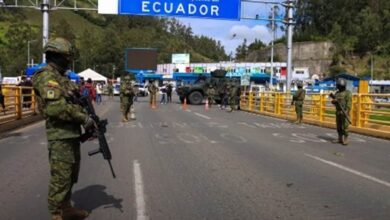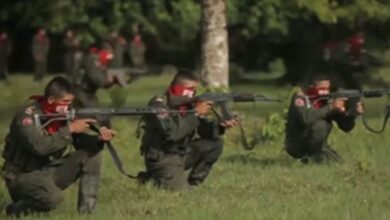Threats Faced by Environmental Defenders in the Amazon Basin
Environmental defenders in the Amazon Basin, including indigenous community leaders, are grappling with a lack of legal protections and escalating threats from illegal activities, a pressing issue highlighted during an international gathering in Lima. These defenders from the Peruvian, Brazilian, and Colombian Amazon regions convened to address shared concerns and formulate strategies to secure a more influential role in national policies and the global arena. The discussions underscored the urgency of safeguarding the Amazon and those who protect it in the face of rising challenges and growing environmental and security risks.

Photo: EFE/Paolo Aguilar
EFE
Listen to this article
Leer en español: Amenazas que enfrentan los defensores ambientales en la cuenca del Amazonas
The lack of legislation to protect environmental defenders and the increasing threats due to illegal activities are the main challenges indigenous community leaders face in the Amazon Basin, as shared during an international meeting held this week in Lima.
Identifying Common Problems
"I have identified five common problems: the lack of territorial legal security, the absence of a specific law for protectors and defenders of the territory. Threats from extractive concessions, the lack of strengthening and capacity building for indigenous peoples to defend their territory, and the lack of education are problematic," said Olivia Bisa, President of the Autonomous Territorial Government of the Chapra Nation in northern Peru.
The meeting was attended by defenders who came to the Peruvian capital from various points in the Peruvian, Brazilian, and Colombian Amazon, as well as leaders of native communities from Central America. They gathered to share their concerns and devise strategies that would give them more influence in national policies and on the international stage.
Bisa explained that communities have their territories defined and organized for economic activities, housing, the utilization of resources, and spirituality. Companies, authorities, and criminal groups often violate this order.
"We demand that indigenous peoples manage their resources and be free to decide in their territories. We lack this because an indigenous people without territory is a dead indigenous people," she expressed.
She referred to how oil concessions, informal loggers, road projects, and regional land exploitation policies for mass cultivation overlap in ancestral territories of the nations. Like her, many leaders who came to Lima highlighted the challenges they faced in obtaining the title to their territories because without it, "they are nothing."
"Communities that are not titled do not exist, and it is a space for the government to carry out its activities as it pleases," said the President of the Chapra Nation, who resides in the Amazonian department of Loreto in northern Peru.
Common Threats
"There have been direct threats to people, mainly by illegal loggers. When we defend our wood and see our streams and rivers drying up, and we no longer have water, they scare away our animals," said Cádiz Caballero, the regional coordinator of indigenous peoples from San Lorenzo.
They report that, besides illegal actors in their territories, they must contend with the indifference and impunity of authorities and the justice system.
"As a people, we file complaints, but they threaten us with wanting to kill us. We will not allow it, and often, we go to the courts… and then they release the person," Caballero stated.
Bisa also mentioned that companies have sometimes sued leaders like her for defending the land, and many have complaints and sentences against them, which, according to her, tries to silence their voices and scare them.




